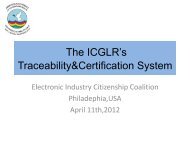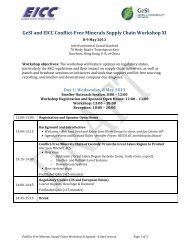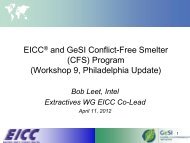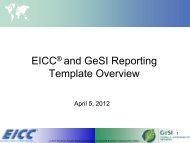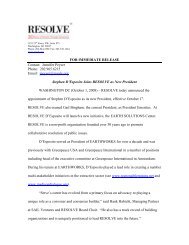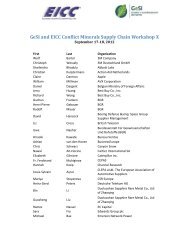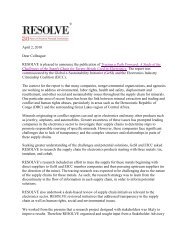What is Consensus-Building and Why is It Important for ... - Resolve
What is Consensus-Building and Why is It Important for ... - Resolve
What is Consensus-Building and Why is It Important for ... - Resolve
Create successful ePaper yourself
Turn your PDF publications into a flip-book with our unique Google optimized e-Paper software.
assessment to help parties assess how potential negotiation results would compare with their<br />
alternatives. Often, how the negotiation process <strong>is</strong> organized will directly affect the potential of<br />
the process to sat<strong>is</strong>fy parties' interests. A key product of any feasibility assessment will be<br />
general agreement (often mediated) among the parties as to who will participate <strong>and</strong> in what<br />
way, the scope of <strong>is</strong>sues, any deadlines, frequency of meetings, in<strong>for</strong>mation needed to make<br />
sound dec<strong>is</strong>ions, who the mediator will be (if any), <strong>and</strong> other ground rules.<br />
Multiple Parties/Issues<br />
Because natural resources, although renewable, are finite <strong>and</strong> ex<strong>is</strong>t in specific places, claims of<br />
rights to use the "same" locations <strong>for</strong> different uses are made by multiple units <strong>and</strong> levels of<br />
government <strong>and</strong> diverse private interests. Th<strong>is</strong> generally means that resource management<br />
d<strong>is</strong>putes involve many parties <strong>and</strong> many <strong>is</strong>sues, making organizing any negotiation process<br />
more difficult. Sometimes coalitions can be <strong>for</strong>med, where several parties can be represented<br />
by one negotiator. Concerns have been ra<strong>is</strong>ed about limits to participation being imposed in<br />
some consensus‐processes, where national interests may be at stake over what others might<br />
view as local resources. Th<strong>is</strong> <strong>is</strong>sue of scale, who has a right to participate, <strong>and</strong> the inability due<br />
to lack of resources of some groups to participate in many different processes needs<br />
exploration.<br />
Complex Scientific <strong>and</strong> Technical Issues<br />
Sound scientific <strong>and</strong> technical in<strong>for</strong>mation <strong>is</strong> essential <strong>for</strong> creating solutions that work.<br />
However, parties to natural resources <strong>is</strong>sues are confronted with large volumes of in<strong>for</strong>mation,<br />
requiring a wide variety of expert<strong>is</strong>e, <strong>and</strong> subject to honest differences of interpretation.<br />
Furthermore, gaps <strong>and</strong> uncertainties in the available in<strong>for</strong>mation base are inevitable as<br />
scientific underst<strong>and</strong>ing continues to grow.<br />
Models can be developed to help deal with scientific uncertainties, but they themselves can be<br />
sources of d<strong>is</strong>pute between the model builders or sources of confusion in negotiations where<br />
parties have unequal technical resources. Joint fact‐finding processes, in which parties agree on<br />
the design of a model or study in advance, show considerable prom<strong>is</strong>e. Similarly, technical<br />
committees or in<strong>for</strong>mation sharing workshops have been used constructively to supplement<br />
policy negotiations.<br />
Public/Political Dimension<br />
Another character<strong>is</strong>tic complicating resource management conflicts <strong>is</strong> that the <strong>is</strong>sues in d<strong>is</strong>pute<br />
involve public matters that may need to be resolved in public <strong>for</strong>ums. Negotiators need to deal<br />
with the press <strong>and</strong> open meeting laws sensitively, <strong>and</strong> arrive at outcomes that can withst<strong>and</strong><br />
public scrutiny <strong>and</strong> comment. Carefully designed, consensus‐building processes can maximize<br />
the flexibility within public institutions while holding negotiated solutions to the same legal <strong>and</strong><br />
regulatory st<strong>and</strong>ards to which any dec<strong>is</strong>ion would be subject.<br />
Conclusion<br />
Experience suggests that the following prerequ<strong>is</strong>ites <strong>and</strong> strategies will increase the likelihood<br />
that consensus‐building can be successful in complex, resource management <strong>is</strong>sues:<br />
all can gain something they value in the process;<br />
<strong>What</strong> <strong>is</strong> <strong>Consensus</strong>‐<strong>Building</strong> <strong>and</strong> <strong>Why</strong> <strong>is</strong> <strong>It</strong> <strong>Important</strong> <strong>for</strong> Resource Management?<br />
6



